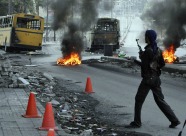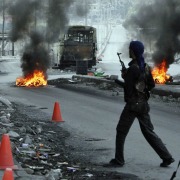
Alpher discusses what are the potential security consequences for Israel of the fighting in Syria reaching the UN-patrolled no-man's land between Israel and Syria and more UN forces leaving, whether Russia's President Putin's offer last week to send Russian forces to replace the Austrians who are departing UNDOF makes sense for Israel, what to make of IDF Chief of Staff Benny Gantz's announcement last week, during all the turmoil in Syria, that for budgetary reasons he is suspending reserve units' training this year, and whether Ethiopia's construction of a massive dam on the Blue Nile -alarming Egypt about being denied water- will result in the water wars predicted by King Hussein of Jordan decades ago.
Q. The fighting in Syria has reached the UN-patrolled no-man's land between Israel and Syria and more UN forces are leaving. Netanyahu says Israel must not depend on international forces. What are the potential security consequences for Israel?
A. The departure decision last week by the Austrian contingent to UNDOF--the backbone of the force, which also comprises Indian and Filipino troops--has triggered renewed discussion in Israel of the future of the Golan and the role of the international community in maintaining the 1974 disengagement agreement there between Israel and Syria. UNDOF, the "United Nations Disengagement Observer Force", is just that, an observer force. It is not expected to fight and is certainly not supposed to be fired at and subject to kidnappings, as has happened in recent weeks on the Syrian side of the border. At the risk of waxing demagogic, Austrian mothers did not send their soldier sons to the Golan to be shot at. Sadly, this is where the role of a peacekeeping force ends.
Israeli Prime Minister Binyamin Netanyahu stated to ministers at the weekly cabinet meeting on Sunday that what is happening to UNDOF proves that Israel cannot rely on any international body for protection in a future peace agreement with Palestinians. For once I agree with the prime minister, even if I would have framed the issue a bit differently: international forces like UNDOF, UNIFIL in Lebanon and the MFO in Sinai can succeed only if they are "icing on the cake", meaning a kind of additional insurance policy designed to add a layer of certitude to an already stable agreement. They are not intended to "protect" Israel. On the Golan, after nearly 40 years of quiet, the "cake" is crumbling--both because of the Syrian civil war and because Syrian President Bashar Assad is threatening to initiate attacks on Israel from there.
In the Palestinian context that Netanyahu referred to, an international force could be effective in the West Bank only if Israel and the PLO reach a strong agreement and the PLO can be depended on to fulfill the agreement's demilitarization provisions to the letter: in other words, only if the agreement could be maintained if necessary without an international force. Netanyahu knows perfectly well that the problem with the Palestinians is not an international force: it's the reality on the ground that has been created to a large extent by the settlements that makes a two-state solution increasingly difficult.
Note that the only Israeli border where there is no international force is with Jordan. This is the exception that proves the rule: trust between the two countries' leaders and particularly their militaries, along with the total control both sides exercise on the ground, have thus far rendered an international force unnecessary. In Egyptian Sinai, the MFO (a non-UN international observer force that inspects demilitarization arrangements instituted in 1981) has been threatened lately precisely because Egypt has lost control over parts of Sinai where Bedouin and Salafists are marauding.
On the Golan, UNDOF patrols a totally demilitarized no-man's land that runs 75 km north-to-south and varies in width from 200 meters to 10 kilometers. UNDOF also certifies that additional, partially-demilitarized strips of land extending 25 km. into both the Israeli and Syrian sides of the Golan DMZ are not violated. Last week, with UNDOF still around, Syrian tanks moved into the border town of Kuneitra in violation of the 1974 agreement. They were combating rebel forces. The Syrian military acted to coordinate the move with Israel via UNDOF, thereby avoiding a potentially escalatory incident. If the international force is removed, fighting among three forces--the IDF, the Syrian army and Syrian rebels--is liable to take place in the no-man's land and perhaps beyond. Not an encouraging prospect.
Q. Russia's President Putin offered last week to send Russian forces to replace the Austrians who are departing UNDOF. Does this make sense for Israel?
A. This is mischief-making on Putin's part. He presumably knows that the agreement that created UNDOF bars permanent United Nations Security Council members from participating in the force. Further, Russia is Assad's principal backer on the international scene and has been blocking attempts at the UN to reduce the carnage inside Syria.
Still, at the level of brainstorming the idea is intriguing. On the one hand, who better than the Russians could ensure Syrian compliance with the disengagement agreement? On the other, putting Russian "boots on the ground" in Syria under international auspices is an obvious opening to Russian armed intervention in the Syrian civil war, following on that by Iranian, Hezbollah and Iraqi Shiite irregulars.
Q. While the turmoil in Syria threatens to overflow into Israel, IDF Chief of Staff Benny Gantz announced last week that for budgetary reasons he is suspending reserve units' training this year. Doesn't this leave Israel unprotected?
A. Gantz has been ordered by the Netanyahu government to reduce the IDF budget by NIS three billion (about $830 million) in 2013. This is a consequence of Finance Minister Yair Lapid's effort to deal with what he has called a "catastrophic" mishandling of the economy in recent years by the previous Netanyahu government that left Israel with a dangerous overdraft. Gantz's decision to implement the cut by virtually ceasing all reserve combat unit training this year is a very dramatic response to the Finance Ministry's demand. It can be understood in several very different ways.
First, in the short term this is the easiest way to save money without cancelling long-term research and development projects and without touching the air force and navy, which depend far less on reserves than the army. Assuming that next year the reserves resume training, the disruption is limited to just over six months.
Second, Gantz presumably assesses that Israel will not face a land war in the months ahead, where the absence of trained and fit reserve units would be felt. Rather, it faces border patrol issues on the Egyptian, Gazan, Lebanese and particularly Syrian borders. It might need the air force in the Syria-Hezbollah context. And it needs the Navy, which is expanding rapidly, to protect Israel's burgeoning natural gas project in the Mediterranean and (with a growing submarine fleet) to project a deterrent second-strike capability toward Iran.
Third, and somewhat contrary to the above, Gantz, backed by Defense Minister Moshe "Bogie" Yaalon, himself a former IDF chief of staff, presumably understood that his decision would set off alarm bells among the Israeli public, where the memory of fighting the 2006 Second Lebanon War with poorly trained and equipped reserve infantry units is still fresh. From this standpoint, the chief of staff's move is designed to persuade the government to find another way to save money. But it also has the effect of resurrecting reform plans broached in recent years to turn the IDF into a smaller and more efficient army.
Here, incidentally, is the place to note that cuts in the IDF budget instituted in recent years have in virtually every instance been balanced a few months later by additional allocations to the military that the Finance Ministry mysteriously comes up with to finance emergency programs like the sophisticated Sinai-Negev and Golan border fences.
Q. Ethiopia has begun construction of a massive dam on the Blue Nile and Egypt is so alarmed about being denied water that threats of military retaliation are being heard in government circles. Some observers like the late King Hussein of Jordan predicted water wars in the region decades ago. Is this it?
A. If I had to predict a likely Middle East war that does not involve Iran, Hezbollah and the mess in Syria, it would be a water war launched by Egypt. The reasons have almost nothing to do with the rise to power of the Muslim Brotherhood in Egypt. The Brethren are no different than other Egyptians in viewing the Nile waters as Egypt's existential lifeline in an almost primeval way: nearly all of Egypt's 85 million or so population depends on the Nile for sustenance.
On the other hand, deep in sub-Saharan Africa, growing populations in a dozen Nile riparian countries also increasingly need the waters of the White and especially Blue Nile (which carries fully 80 percent of the water reaching Sudan and Egypt). For long, they have been hamstrung in their efforts to dam, divert and otherwise exploit Nile waters by colonial era agreements imposed upon them by the British that allot most of the Nile waters to Egypt. Ethiopia's decision to build its "Renaissance Dam", the biggest dam in Africa, is the most provocative African attempt to change the rules of the game.
As the dam's construction begins, Egypt's protests are becoming shriller, with a number of Muslim Brotherhood politicians threatening military action. This would presumably involve (on Egypt's side) Sudan, which borders on both countries and has an Islamist-leaning government. Some Egyptian experts predict a serious water shortfall for several years once Ethiopia begins filling the artificial lake the dam creates. Ethiopia, whose population is growing as fast as Egypt's, has offered to negotiate with Cairo and find ways to compensate it, but insists it must proceed with the dam to supply its own water and power needs.
Any water deficit suffered by Egypt could conceivably be supplied if work is resumed in South Sudan on the Jonglei Canal project to dry up and channel swampland along the White Nile in the Sudd region. That project was derailed by civil war a couple of decades ago. The very notion of renewing it points to the broad regional nature of the growing water deficit problem in the huge Nile basin.
This is a dispute to keep an eye on. Israel is very friendly with Ethiopia and supplies it with weapons and training. But it desperately needs to maintain good working relations with the Egyptian military due to the situation in Sinai.
